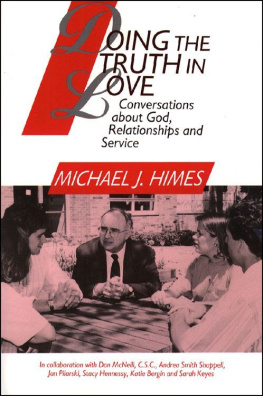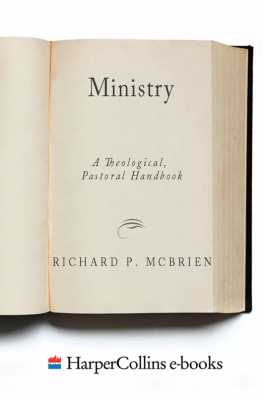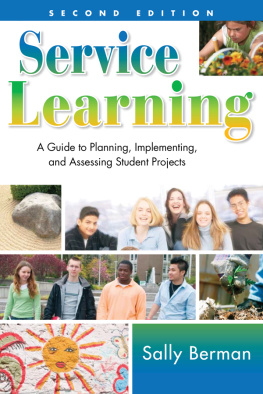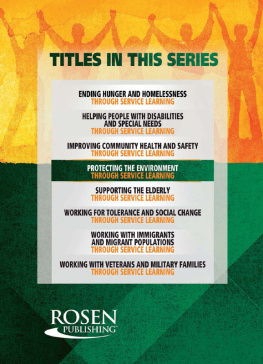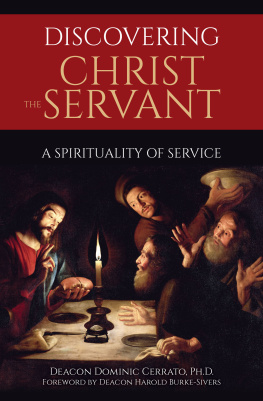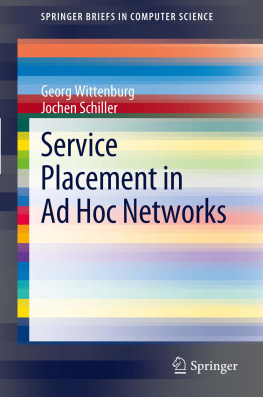Doing the Truth in Love
Conversations about God,Relationships, and Service
Michael J. Himes
in collaboration with
Don McNeill, C.S.C., Andrea Smith Shappell, Jan Pilarski,
Stacy Hennessy, Katie Bergin, and Sarah Keyes

Paulist Press
New York/Mahwah, N.J.
Excerpt from As I Walked Out One Evening from W.H. Auden: Collected Poems by W.H. Auden, copyright 1949 and renewed 1968 by W. H. Auden. Reprinted by permission of Random House, Inc.
All the Scripture quotes in this volume are the authors own translations except where noted with the symbol NJB.
Those Scripture quotes noted with the symbol NJB are from The New Jerusalem Bible (Garden City, N.Y.: Doubleday & Company, Inc., 1985).
Copyright 1995 by Michael J. Himes
All rights reserved. No part of this book may be reproduced or transmitted in any form or by any means, electronic or mechanical, including photocopying, recording, or by any information storage and retrieval system without permission in writing from the Publisher.
Library of Congress Cataloging-in-Publication Data
Himes, Michael J.
Doing the truth in love : conversations about God, relationships, and service / Michael Himes : in collaboration with Don McNeill [et.al.]
p. cm.
Includes bibliographical references (p. )
ISBN 978-1-61643-269-0
1. Service (Theology) 2. LoveReligious aspectsChristianity. 3. Church workCatholic Church. 4. Vocation. 5. Catholic ChurchMembership. I. McNeill, Donald P. II. Title.
BX2347.H55 1995
230.2dc20 95-8644
Published by Paulist Press
997 Macarthur Boulevard
Mahwah, New Jersey 07430
www.paulistpress.com
Contents
ThanksGracias!
The most enjoyable part of working on this book was the process of conversing with many persons. We are particularly grateful to the students, in and out of the classroom, who raised questions which kept the discussions going as they reflected on the persons they encountered in Urban Plunges, Appalachian Programs, Summer Service Projects, etc. Supporting these service opportunities for students, we extend our gratitude to the staff of the Center for Social Concerns, the Institute for Church Life, the Alumni Association, and the ICL Advisory Council.
We thank Agnes McNeill Donohue, Margie Fink, Bob Hamma, Ingrid Schmidt, and Dominic Vachon for their thoughtful reading and suggestions for the evolving text.
We are grateful to the Notre Dame Department of Theology in which Michael taught for six years and to the residence hall communities in Keenan and Pasquerilla East, and to Rachel Toms-Morgan and others who encouraged the writing of this book.
Typing and organizing transcriptions would have been impossible without the assistance of Anne McGuire, Ardis King, Sandy Barton, Carol Porter, Carol Grey, Margie Davis, Marty Tracy, Kristin Carlson, and Emy Lou Papandria. We appreciate the research of Margy Pfeil and Martin Connell. Sheryl Dyer, Linda Dunn, and Barbara Parker-Stephenson were the photographers who helped bring the words to life.
We thank Michael Barkasy, Bob Elmer, Katie Glynn, Lou Nanni, Regina Weissert, Ron White, and Maria Teresa Gaston-Witchger for their insightful responses which integrate theology with their life experience. Gracias to Fr. Theodore M. Hesburgh C.S.C., Dolores Lecke, Jim and Evelyn Whitehead, and Henri J. M. Nouwen for their book review and comments on the back cover. Those of us with spouses and families appreciate the words of encouragement and the space given so we could be creatively involved in this project. We are grateful to Paulist Press and especially Richard Sparks for his encouragement and assistance throughout the process of developing the manuscript and the book. All involved with the Center for Social Concerns are deeply grateful to Michael Himes for the royalties from this book which will allow more students, alums, and others to do the truth in love.
Companions in Conversation: Himes Perspective
Few needs are as pressing and as often go unmet in our world as the need for a place to converse. We all require somewhere, some circle of companions, where and with whom we can enter into the demanding task of trying to say what we experience and to understand what others say in response. There may be many places and opportunities for passing the time of day, shooting the breeze, pleasant chat, although I suspect that for many such places and occasions are also becoming rare, but circles of conversation are precious, indeed. Such places may be libraries, for frequently the most valuable, far-ranging and transformative conversations are with people who are not present and do not happen to be living any longer. Thank God for books! If we did not have them, we would be forced to talk only to nearby contemporaries. Conversation, whether with those around us or those separated from us in space and time or, ideally, both, is necessary for thinking. How would we ever know what we do and feel and experience if we did not talk about our actions and feelings and experiences with others? This is true for everyone and it is certainly true for theologians.
While teaching at the University of Notre Dame, I was privileged to be part of several circles of conversation, one of the most fruitful of which was at the Center for Social Concerns, a particularly bright jewel in Notre Dames crown. Thanks to the welcome and support of the Centers always gracious staff, I had many opportunities to talk with students, alumni and alumnae, and others engaged in discerning how the Christian call to service with ones neighbor can be lived out in a world where marriages are formed, children raised, mortgages paid and careers pursued. Through many conversations we talked about who God is, about relationships and what Christianity is about, and how we might reimagine our lives and our world in light of what we believe about God in the Christian tradition.
Don McNeill, C.S.C., Andrea Shappell and other members of the Centers staff urged that some of these conversations be made available to those not present there and then (again, thank God for books!). I was initially reluctant, both because I doubted whether what I said in the relaxed atmosphere of these conversations would be of interest to those who had not been present and because of the difficulty in recalling comments made on numerous occasions over the course of several years. Ah, but the ever-resourceful folks at the Center had an answer for those worries. They had been tapingand taping and taping and taping, and it appeared that scarcely had an unrecorded word fallen from my lips. Don McNeill suggested that a group of people go through these hours and hours of audio and video-tape and select points to be transcribed which they thought others might find helpful in thinking through their experience of living Christianity. With extraordinary patience and industry this was done. They also transcribed some audio tapes from a few presentations given outside the Center for Social Concerns and from some classroom sessions with students at Notre Dame. Of course, prose-to-be-heard differs greatly from prose-to-be-read, and so I extensively edited and rearranged the material.
At the urging of the group of colleagues who had selected the material from the tapes, I have preserved the informal, conversational tone of the originals. What we were not able to preserve, however, was the context of the conversation, the back-and-forth exchange, the questions or objections which led to clarifications and restatements. In order to allow other voices than mine to be heard, seven chapters have a comment, response or expansion from the experience of someone else or a few persons. These are followed by questions by Stacy Hennessy to prompt further personal or group conversation. It is my hope that the book which has resulted carries some of the flavor of those conversation circles which I so much appreciated at the Center for Social Concerns.
Next page
